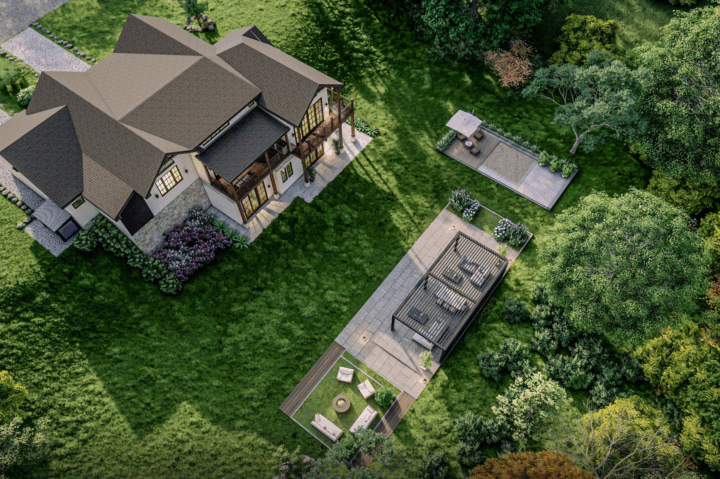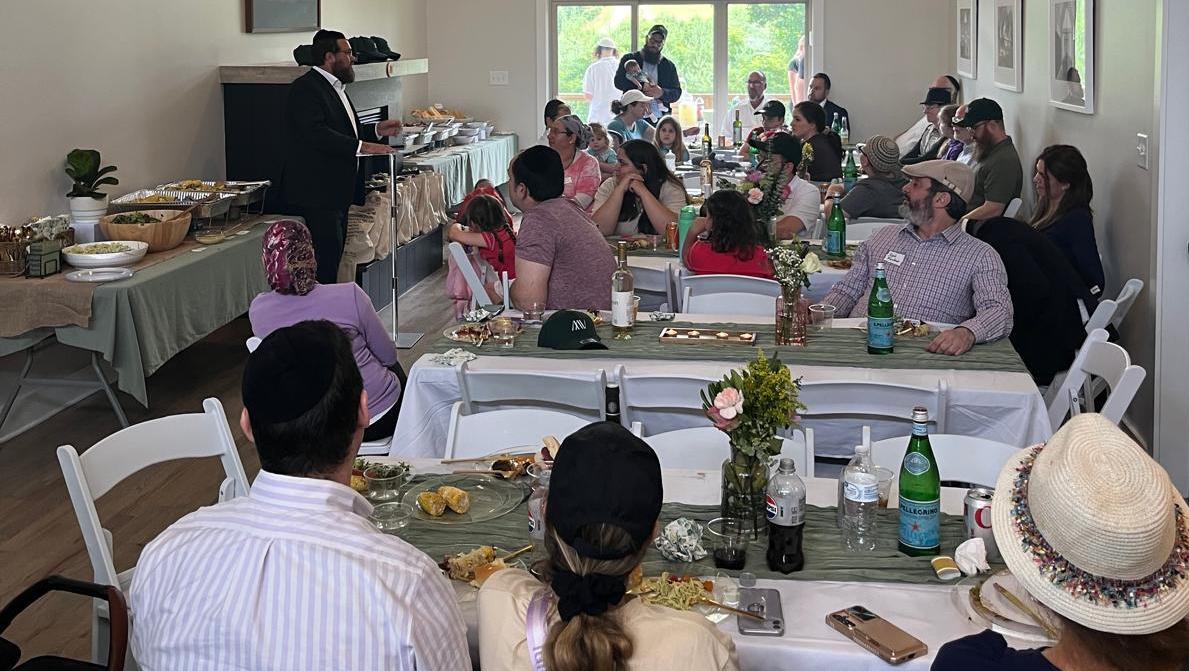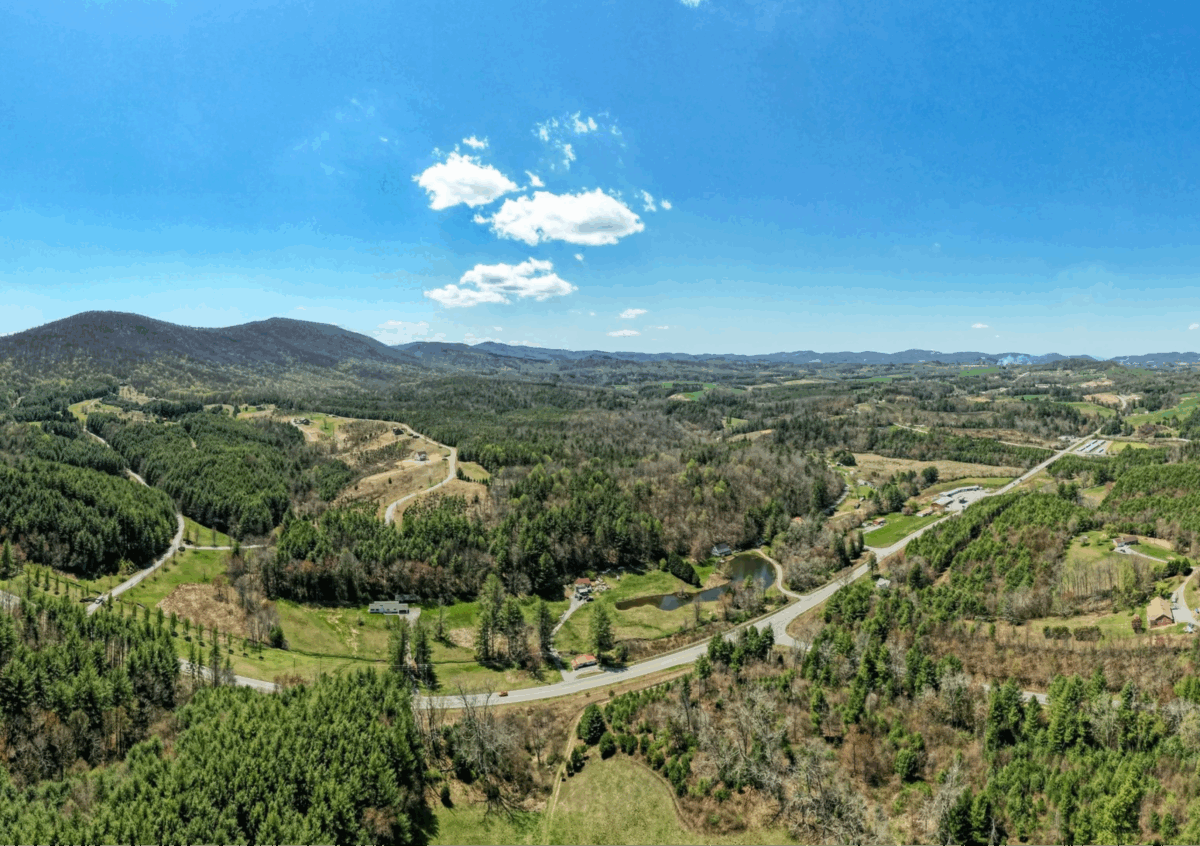A development called Mountain View, still in its early days, aims to build an Orthodox community from the ground up in Sparta, N.C.

Courtesy
Picture of Mountain View development from brochure
When Aimee Greenfield, a real estate agent in Sparta, N.C., posted in a Facebook group for Orthodox Jews last year with information about plots of land for sale in an undeveloped gated community in her town, she had two goals.
The first was to convince enough Orthodox Jews to uproot their lives and move to a small town in the Blue Ridge Mountains in order to start a new, close-knit rural Jewish community there, which might eventually sustain a synagogue and a kosher supermarket — all in the hopes that Greenfield’s kids, who are religiously observant, would move there and live close to her.
The second goal was downstream of the first, but still important to Greenfield, herself an observant Jew who has lived in Sparta for 13 years: get enough Jewish women in this town of fewer than 2,000 people near the Virginia border for Greenfield to be able to sustain a weekly mahjong game. “I’m not worried,” she said when speaking with Jewish Insider last Thursday, while braiding and decorating six challahs for Shabbat. “I’m going to accomplish both goals before I die.”
Her enthusiastic Facebook posts found their way early last year to Yudi Gross, a financial planner in Florida who, after reaching Greenfield on the phone, flew to North Carolina to meet her. Gross thought he might buy a plot of land to develop a vacation home for his family. Instead, he spotted a business opportunity, and a spiritual one. With other private investors, Gross bought the entire gated community, with plans to build 350 homes. He called the project Shefa Living, “shefa” being Hebrew for “abundance.”
“If we were to build a Jewish Orthodox community from scratch, how can we do it differently, and how can we do it in a way that creates healthy environments for the children to learn and grow, and healthy environments for adults to continue to learn and grow?” Gross said in a recent interview with JI.
He knows his pitch is somewhat unorthodox: Move to the mountains. In North Carolina. To a tiny town with no synagogue and few other Jews for miles. But what he’s pitching is a radical vision of what observant Judaism could look like if not bound to the geographical constraints that have kept Orthodox communities from rural living.

“This is not just 25-30 people who want to have a nice place in the summer. This is a dream for so many people,” said Gross. “I hope this transforms the way Orthodox families can choose to live geographically.”
He chose Sparta out of what some in the Jewish community might deem bashert, a Yiddish word for “destiny” or “soul mate.” After seeing Greenfield’s post, he didn’t consider whether other areas might be better suited for a new Jewish community; he felt there was something magical about Sparta.
Still, Gross, who founded a wealth management firm, knows recruiting people to the neighborhood is a heavy lift. The nearest cities, Winston-Salem and Greensboro, are over an hour away, and Charlotte is nearly two hours away. People who buy homes in Mountain View, as the neighborhood will be called, must also buy into the vision of building a tight-knit community from the ground up (literally — the homes won’t be ready for at least a year).
Rabbi Yaakov Moshe Twerski, a rabbi from Monsey, N.Y., is on board to oversee religious matters in the community. Plans are underway to build a mikveh, a kosher supermarket, an Orthodox school system and a yeshiva — a second location of Yeshivas Lev Simcha, a religious school in Boca Raton, Fla. A synagogue has already been constructed.
All has not gone perfectly to plan; a group of yeshiva students were set to move to Sparta this fall, but zoning issues delayed the first batch of residents from coming to Mountain View until September 2026. But local officials in Sparta are excited about the community, according to Gross, a contrast to the antisemitic resistance put up in some New Jersey municipalities where Orthodox populations have increased in recent years.
“It’s almost unheard of, from my experience, to see such a community being so open-armed about Orthodox Jews moving in,” Gross said. “I remember going to town, people stopped us to say shalom.” Greenfield noted that Sparta is a conservative Bible Belt town: “They love Jewish people,” she said simply.
Glossy marketing materials on Shefa Living’s website call it a “new Torah-centric community in the Blue Ridge Mountains.” A frequently asked questions section touts North Carolina’s low state income tax and property tax rates, an educational voucher program and a lower cost of living.

Mountain View is described as a place “where Yiddishkeit, spacious living and nature are seamlessly intertwined for mountain living without compromise.” A brochure shows three-bedroom, 2,200-square-foot homes starting at $549,000, and five-bedroom, 4,200-square-foot homes starting at just over $1 million.
Buyers have put down deposits on 60 homes, Gross said. Starting in September, they’ll choose their lots, and work with developers on selecting upgrades and finishes in the new homes. More than 150 people have visited North Carolina to tour the site.
One of the first Mountain View homeowners is Blimy, a mother of four from South Florida who asked that only her first name be used to protect her family’s privacy. She and her husband decided to jump in at the beginning to help build the community because they were true believers in its mission — the slow pace of life in a quieter community with fresh air and proximity to hiking, rivers and more.
“I always wanted to be a hermit in the mountains, but then you’re missing community. I love the idea of having quiet around you, being able to feel yourself and feel your inner alignment and feeling connection to Hashem, to spirituality from within,” Blimy told JI.
Most of the visitors to Sparta have come from New York, Florida and California, according to Gross. The earliest buyers know that going first means they’ll be arriving next year to help build Mountain View, when some of the proposed amenities, like a fully stocked kosher supermarket, may not yet be open. It may require commuting back to their old communities for work, or seeking remote opportunities.
“I think that the people who are going to be drawn here first are the pioneer types, the ones who are not needing the support that other people might need right away. They’re interested in leadership,” said Blimy. “I’m looking forward to the kind of community that this will be at the outset, because I think it will be really special, and what it will evolve into.”















































